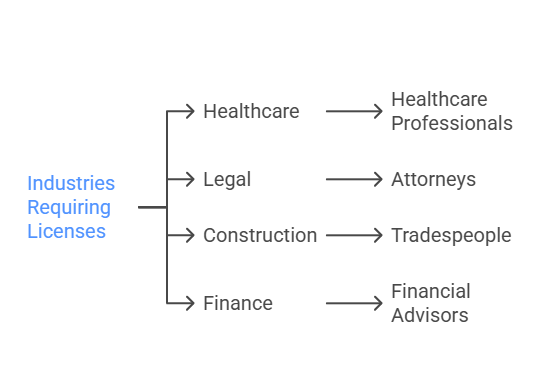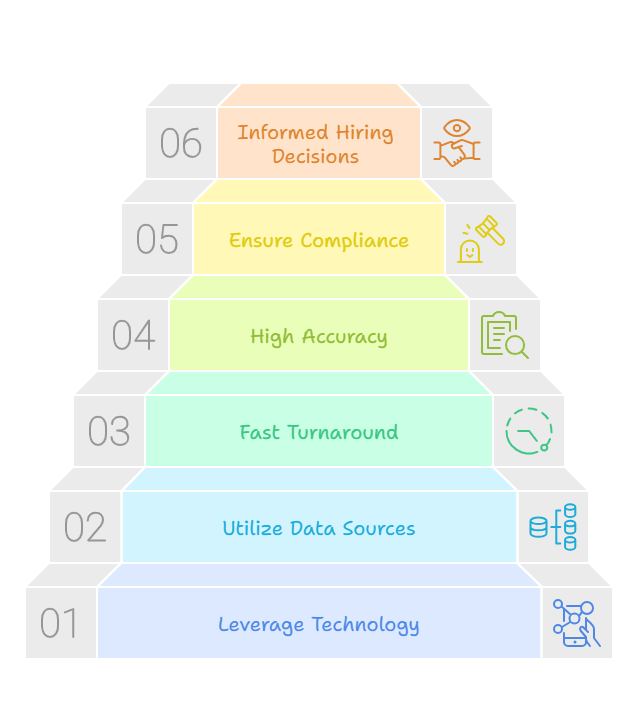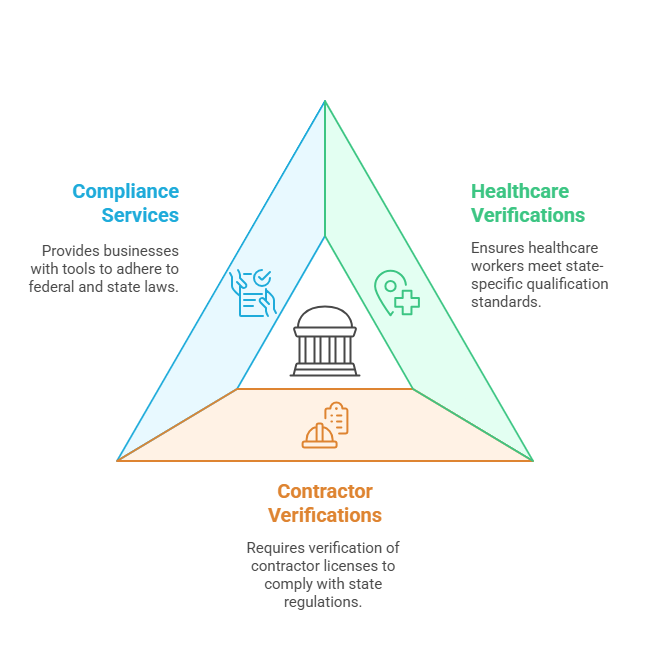The Significance of Professional License Verification in the Hiring Process
Professional license verification refers to the process of confirming that a candidate possesses the necessary legal qualifications to practice in a specific profession. This is especially important for roles in regulated industries such as healthcare, law, construction, and finance, where credentials ensure that workers meet the required standards and adhere to industry regulations. Verifying professional licenses ensures that employers are hiring individuals who are legally qualified and competent to perform the job responsibilities safely and efficiently.
Why Professional License Verification Is Critical
License verification is vital for employers because it helps mitigate the risks associated with hiring unqualified candidates. Without proper verification, hiring decisions could lead to costly consequences. For example, in regulated industries, hiring an unlicensed worker could result in compliance violations, legal liabilities, or safety risks. License verification ensures that candidates meet all legal requirements, which is essential for protecting both the employer and the public.
The Role of Professional Licenses Across Various Industries
Different industries rely on professional licenses to maintain safety standards and uphold ethical practices. In healthcare, for example, a verified license confirms that practitioners have the necessary qualifications to treat patients. Similarly, in the legal field, attorneys must possess valid licenses to represent clients and offer legal advice. For construction workers, licenses are required to ensure compliance with building codes and safety regulations. The finance industry also mandates licenses for financial advisors to ensure they comply with federal and state regulations governing their services.
Industries That Benefit from License Verification

- Healthcare: Doctors, nurses, and therapists require licenses to ensure patient safety and care quality.
- Legal: Attorneys must be licensed to practice law in their jurisdiction.
- Construction: Tradespeople such as electricians and general contractors must hold valid licenses to ensure safe and compliant work.
- Finance: Financial advisors and brokers must be licensed to operate legally within the financial industry.
The Risks of Hiring Unlicensed Professionals
Hiring unlicensed professionals can expose a company to numerous risks. Unlicensed individuals may lack the necessary training and expertise, leading to inefficiencies or even dangerous outcomes. Additionally, employing unlicensed workers in regulated industries can result in fines, lawsuits, and the potential loss of business licenses. To avoid these risks, it’s crucial for employers to verify the credentials of every candidate before hiring.
A Comparative Look at Licensed vs. Unlicensed Professionals
| Industry | Licensed Professionals | Unlicensed Professionals |
|---|---|---|
| Healthcare | Ensures quality care; legally able to treat patients. | May cause harm to patients; lacks accountability. |
| Legal | Legally authorized to represent clients; ensures adherence to the law. | Ineligible to practice law; risk of legal malpractice. |
| Construction | Meets safety standards; ensures regulatory compliance. | Could endanger workplace safety; subject to penalties. |
| Finance | Complies with financial regulations; authorized to offer advice. | Can mismanage finances; non-compliant with regulations. |
How License Verification Helps Protect Employers and Employees
By performing professional license verification, employers can ensure that they are hiring individuals who are properly qualified to perform their roles. This protects both the company and its employees by promoting safety, reducing risks, and ensuring legal compliance. Verifying a candidate’s professional credentials also helps employers build a reputation for hiring qualified, trustworthy individuals.
RapidHireSolutions vs. Competitors: A Detailed Comparison
Professional license verification is crucial for businesses to maintain workplace compliance and mitigate hiring risks. While many providers offer this service, it’s essential to choose a reliable and efficient partner. RapidHireSolutions excels in providing fast, accurate, and comprehensive license verification, helping employers make informed hiring decisions. In this section, we will compare RapidHireSolutions to other background check service providers, highlighting their strengths and weaknesses in the professional license verification process.
Key Advantages of Using RapidHireSolutions
✅ Fast Processing Time: RapidHireSolutions delivers results within 1-2 days, ensuring that employers can proceed with hiring decisions without unnecessary delays. This quick turnaround time is especially beneficial for businesses looking to fill critical roles promptly.
✅ Comprehensive License Verification: Unlike other providers that may only verify a limited number of credentials, RapidHireSolutions conducts thorough checks across multiple industries. Whether in healthcare, law, construction, or finance, RapidHireSolutions ensures that professionals meet industry standards.
✅ High Accuracy: RapidHireSolutions is committed to delivering accurate results. By accessing real-time data from reputable sources, RapidHireSolutions guarantees that employers are receiving up-to-date information about a candidate’s credentials, ensuring peace of mind in the hiring process.
✅ FCRA Compliance: RapidHireSolutions adheres to all legal requirements, including the Fair Credit Reporting Act (FCRA), ensuring that license verification is conducted in full compliance with regulations. This is vital for companies to avoid legal pitfalls associated with non-compliance.
✅ Excellent Customer Support: RapidHireSolutions provides stellar customer service, offering businesses timely assistance and guidance throughout the verification process. Clients can rely on expert support for any inquiries or issues that arise.
Drawbacks of Competitor Providers
❌ Slower Processing Times: Many competitors take 7-10 business days or longer to process professional license verification. This delay can significantly slow down the hiring process, leaving businesses at risk of losing top candidates to other employers who have faster verification systems.
❌ Limited License Verification: Some background check services focus on only a few industries or credentials, leaving gaps in verification. This limitation may not be suitable for businesses that require comprehensive checks across various sectors, such as healthcare, law, and finance.
❌ Inconsistent Accuracy: Competitors may not have access to the same high-quality data sources as RapidHireSolutions, leading to potential discrepancies or outdated information. This can undermine the hiring process, resulting in missed opportunities to identify unqualified candidates.
❌ Compliance Issues: Some competitors fail to meet all compliance standards, including FCRA regulations and industry-specific requirements. This lack of compliance can expose businesses to legal risks, making it essential to choose a provider that prioritizes regulatory adherence.
Data Comparison: Processing Time and Service Efficiency
| Service Provider | Processing Time | License Verification Accuracy | Customer Support | Cost |
|---|---|---|---|---|
| RapidHireSolutions | ✅ 1 day | ✅ High | ✅ Excellent | ✅ Competitive |
| Competitor A | ❌ 7-10 days | ❌ Moderate | ❌ Average | ❌ Higher |
| Competitor B | ❌ 10+ days | ❌ Low | ❌ Poor | ❌ Expensive |
| Competitor C | ❌ 7-10 days | ❌ Moderate | ❌ Below Average | ❌ High |
Let’s Dive Into a Proper Analysis
4 Key Advantages of RapidHireSolutions
- Speed: RapidHireSolutions’ processing time of 1-2 days is significantly faster than competitors, making it an ideal choice for businesses that need quick results.
- Accuracy: The company offers highly accurate license verification, helping employers make informed hiring decisions.
- Comprehensive Service: RapidHireSolutions covers a broad spectrum of industries, ensuring complete verification for various professional roles.
- FCRA Compliance: RapidHireSolutions ensures all verifications are fully compliant with the Fair Credit Reporting Act, protecting businesses from potential legal issues.
4 Disadvantages or Limitations of Competitors
- Longer Processing Times: Competitors take considerably longer, causing delays in the hiring process and possibly resulting in missed hiring opportunities.
- Limited Verification Coverage: Many providers focus on fewer industries, which may not meet the needs of employers in diverse sectors.
- Potential Accuracy Issues: Due to inconsistent data sources, some competitors provide inaccurate or outdated results, which can compromise the hiring process.
- Compliance Gaps: Competitors may fail to comply with all legal standards, including FCRA, putting employers at risk of non-compliance.
How RapidHireSolutions Helps Streamline the Professional License Verification Process

RapidHireSolutions simplifies the complex process of professional license verification by leveraging cutting-edge technology and a vast network of data sources. This enables businesses to quickly confirm that candidates have the necessary credentials for their roles. With a fast turnaround time and high accuracy, RapidHireSolutions ensures that employers are making informed hiring decisions, reducing the risk of hiring unqualified or non-compliant individuals.
Additionally, by adhering to all relevant legal regulations, including FCRA compliance, RapidHireSolutions minimizes the chances of legal complications. Employers can trust that they are meeting their obligations while safeguarding their organizations from potential liabilities related to incorrect hiring practices.
In summary, using RapidHireSolutions for professional license verification allows businesses to streamline their hiring process, reduce risks, and ensure that they are hiring qualified professionals who meet industry standards and regulations.
Understanding Legal Guidelines for Professional License Verification
When conducting professional license verification as part of the hiring process, employers must adhere to a variety of legal requirements. These regulations ensure the protection of both employers and employees while maintaining compliance with industry standards. Here, we’ll explore the legal framework surrounding professional license verification, focusing on key laws such as the Fair Credit Reporting Act (FCRA) and other state-specific requirements that employers must consider.
Fair Credit Reporting Act (FCRA)
The Fair Credit Reporting Act (FCRA) governs the collection, use, and sharing of information in background checks, including professional license verification. When employers use third-party services like RapidHireSolutions to verify a candidate’s license, they must comply with the FCRA’s guidelines to protect the candidate’s privacy rights. Employers must obtain written consent from the candidate before initiating any background checks.
Moreover, if the results of the background check, including license verification, influence a hiring decision, the employer must follow the adverse action process, which includes notifying the candidate of the decision and offering them the opportunity to dispute any inaccuracies.
State-Specific Requirements

Beyond the FCRA, some states have additional requirements for professional license verification, especially in regulated industries like healthcare, law, and finance. For instance, healthcare workers may be required to submit to specific state-level verifications to confirm their qualifications to practice. Employers must ensure that they are familiar with and follow these state-specific rules to avoid legal complications.
For example, in California, businesses may need to verify a professional’s license through state-controlled databases, ensuring that the license is active and has not been subject to disciplinary action. Similarly, construction companies in Texas may need to verify a contractor’s license to ensure it complies with the Texas Department of Licensing and Regulation (TDLR) standards.
By partnering with a service like RapidHireSolutions, businesses can ensure that they stay compliant with both federal and state-specific requirements, reducing the risk of legal violations.
Frequently Asked Questions (FAQs)
What does professional license verification entail, and why is it necessary?
Professional license verification involves confirming that a job candidate holds the required, valid licenses for their profession. This process ensures that candidates are qualified and legally authorized to practice in their field, protecting both employers and employees. It is particularly necessary in regulated industries such as healthcare, law, and finance, where employees are responsible for public safety, legal compliance, and financial integrity.
How can professional license verification protect my company from hiring unqualified candidates?
By verifying a candidate’s professional license, employers can ensure they are hiring qualified individuals who meet industry standards. This verification helps to confirm that candidates have completed the necessary education and training and have not faced any disciplinary action that would affect their eligibility to work in their profession. Without this verification, companies risk hiring unqualified individuals, which can lead to poor job performance, legal liabilities, and reputational damage.
How does RapidHireSolutions ensure accurate professional license verification?
RapidHireSolutions uses a robust network of trusted data sources and real-time access to licensing databases to ensure the accuracy of all license verifications. The company cross-references this data to confirm that candidates hold valid licenses and meet industry-specific regulations. RapidHireSolutions ensures that employers receive up-to-date, accurate information, which is critical for making informed hiring decisions.
What are the consequences of hiring an unlicensed professional in regulated industries?
Hiring an unlicensed professional in regulated industries can lead to severe consequences. These include legal penalties, fines, and potential lawsuits for the employer. For example, if a healthcare provider hires an unlicensed doctor or nurse, it could result in malpractice lawsuits, regulatory fines, and loss of business reputation. Employers also risk violating industry-specific regulations, which could lead to revocation of licenses, loss of clients, or even business closure.
How does the verification process differ between various industries (e.g., healthcare, law, construction)?
The verification process can vary between industries based on the specific licensing requirements and the regulatory bodies involved. For example, in healthcare, employers may need to verify licenses through state medical boards or certification organizations, which may also require checking for any history of disciplinary action. In the legal profession, verification may involve confirming bar association memberships and checking for any history of professional misconduct. In construction, licensing verification may include checking for compliance with local building codes and contractor qualifications RapidHireSolutions ensures that it tailors its verification process to meet the specific needs of each industry.
Conclusion
Professional license verification is an essential process for ensuring that job candidates are qualified, compliant, and legally authorized to work in their respective fields. It helps businesses reduce the risk of hiring unqualified professionals and ensures that workplace safety, industry standards, and legal regulations are maintained. By using services like RapidHireSolutions, employers can streamline their hiring process, ensuring thorough and accurate license verification while remaining compliant with all applicable laws.
Through comprehensive and efficient license verification, RapidHireSolutions offers a reliable solution for employers seeking to reduce hiring risks and maintain a compliant, qualified workforce. With fast processing times, high accuracy, and FCRA compliance, RapidHireSolutions makes professional license verification a seamless and integral part of the hiring process.

